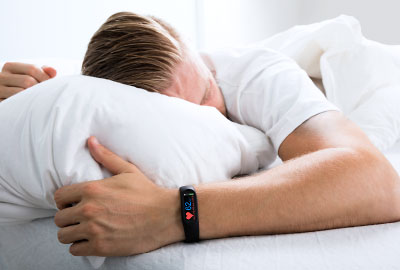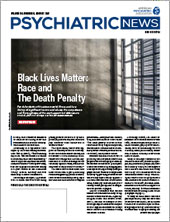A large random sample of American adults who used Fitbit devices to monitor their sleep went to bed later and slept longer in April 2020, a month after the COVID-19 pandemic was declared, than they did before the pandemic, in January 2020.
They also experienced less night-to-night and weekday/weekend variability in sleep, and their resting heart rate decreased, according to a study of data from nearly 164,000 active Fitbit users in six major U.S. cities. Naghmeh Rezaei, Ph.D., then a staff data scientist at Fitbit Inc. in San Francisco, now a senior research scientist at Google, and Michael Grandner, Ph.D., an associate professor of psychiatry and director of the Sleep and Health Research Program at the University of Arizona College of Medicine, Tucson, found that when stay-at-home restrictions eased in some cities in May and June 2020, the duration of sleep in those areas began to return to pre-pandemic norms.
Study results were presented at an online program in April sponsored by the National Sleep Foundation and published in Sleep Health in June.
Rezaei and Grandner examined aggregated, de-identified data from 163,524 Fitbit users aged 18 and older in U.S. cities particularly hard hit by the pandemic: New York, San Francisco, and Los Angeles, where lockdown procedures were rigorous; Houston and Miami, where pandemic guidelines were less stringent; and Chicago, where Fitbit has a highly diverse user base.
All Fitbit users wore a heart rate–enabled Fitbit device during sleep. The baseline was determined by the participants’ sleep stages for at least 10 days in January. They synced their devices at least once in the last 10 days of April 2020, enabling examination of data including nightly and weekly mean sleep duration and bedtime, night-to-night variability of sleep duration and bedtime, and estimated arousals and sleep stages. Study subjects were randomly selected and had agreed to allow their de-identified data to be used. The researchers compared the 2020 data with data from other samples of Fitbit users who contributed at least 10 days of data in 2018 and 2019. Fitbit provided the data and staff time for the study.
Between January and April 2020, Grandner said, Fitbit users aged 18 to 29 went to bed 24 minutes later on average, and those aged 30 to 49 went to bed 17 to 20 minutes later on average. Those aged 50 to 64 averaged a 10- to 14-minute delay, and those aged 65 and older averaged a 9- to 12-minute delay. In the same months of 2019, changes in bedtimes averaged only about 1 to 2 minutes across all age groups.
People under age 50 showed the greatest gains in sleep duration. In April 2020, people aged 18 to 29 slept 9 to 13 minutes longer on average than they did in January 2020, and those aged 30 to 49 slept 6 to 10 minutes longer. Those aged 50 to 64 slept 5 minutes longer, and those aged 65 and older slept 1 minute more.
Women extended their sleep in the pandemic more than men did, with the largest change occurring in young adults, an increase of 12 minutes in women and 8 minutes in men. Fitbit users in 2019 averaged 7 to 11 minutes less sleep across all age groups.
Despite obtaining a little extra sleep, the 18- to 29-year-olds averaged only 7.2 hours of sleep a night, and the other groups averaged less than 7 hours. The American Academy of Sleep Medicine says that most adults need 7 or more hours of sleep a night for optimal health. This recommendation, Grandner told Psychiatric News, is based on self-reports that typically are longer than wearables show.
The April 2020 findings in young adults mirror school start-time data, Grandner said. They suggest that younger adults commonly feel pushed to go to bed earlier than desired to comply with school and work schedules. When young adults in this study had the opportunity to go to bed later and sleep longer, they embraced it. Even modest increases in sleep duration, Grandner noted, may have physiologic benefits.
Fitbit users of all age groups went to bed at more consistent times over the week in April 2020 than they did in January 2020 or in comparable periods in 2019 and 2018. Pandemic-related closing of bars and restaurants and canceled social events may have led to more regular bedtimes, the researchers suggest.
Although polysomnography is the gold standard for recording sleep, Fitbit devices have been validated against polysomnography, with relatively high accuracy for detecting sleep and arousals from sleep that users may or may not recognize subjectively, the researchers noted. Fitbit devices similarly have been shown comparable to wrist-worn activity monitors known as actigraphs, commonly used in sleep research in everyday settings.
Being able to access objective data from large studies of community-dwelling adults, such as this one, the investigators noted, holds implications for using technology to assess sleep and health on a population level. Their study, they said, is among the largest and most representative objective analyses of sleep in general and in the COVID-19 pandemic. ■
“Changes in Sleep Duration, Timing, and Variability During the COVID-19 Pandemic: Large-Scale Fitbit Data From 6 Major U.S. Cities” is posted
here.

